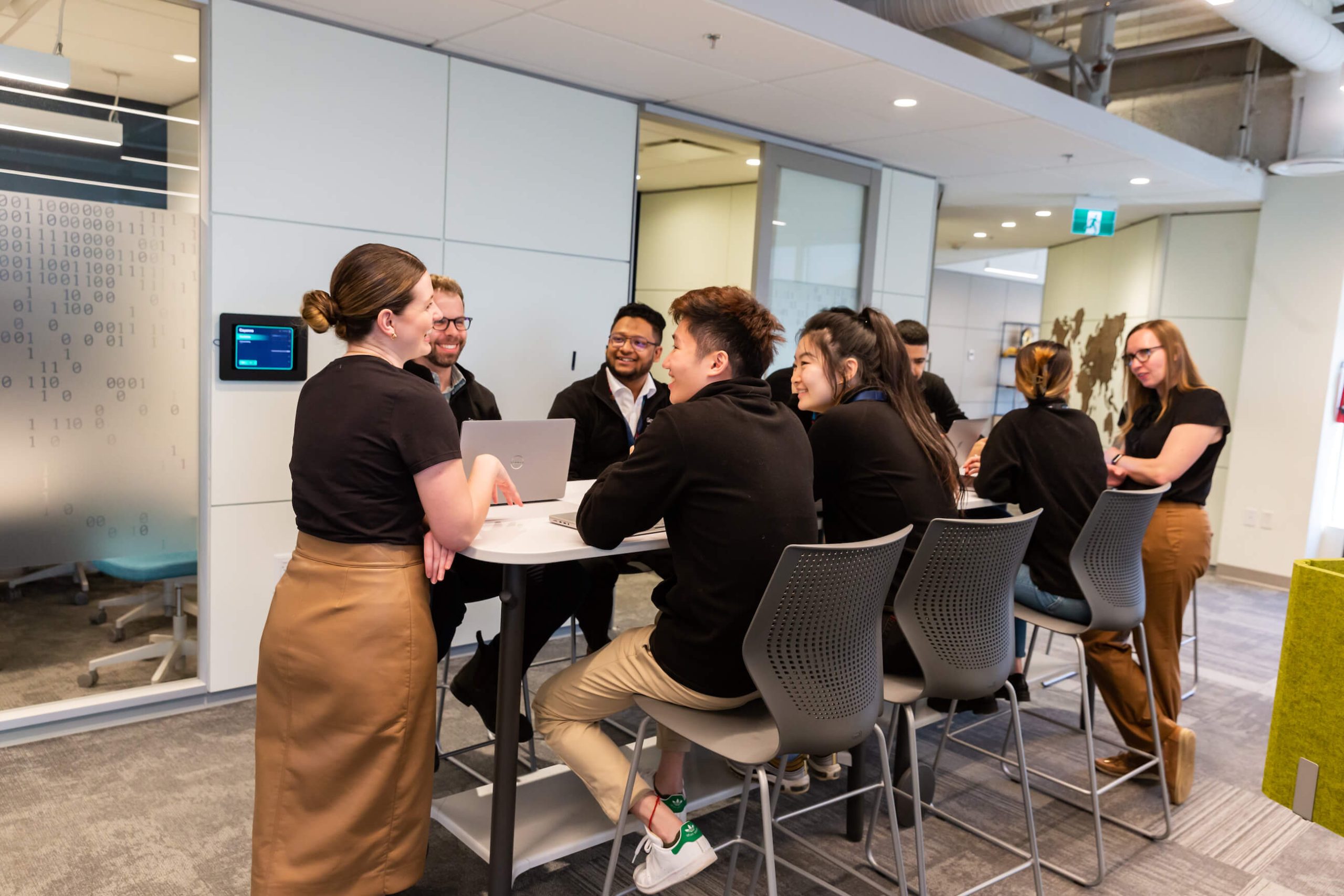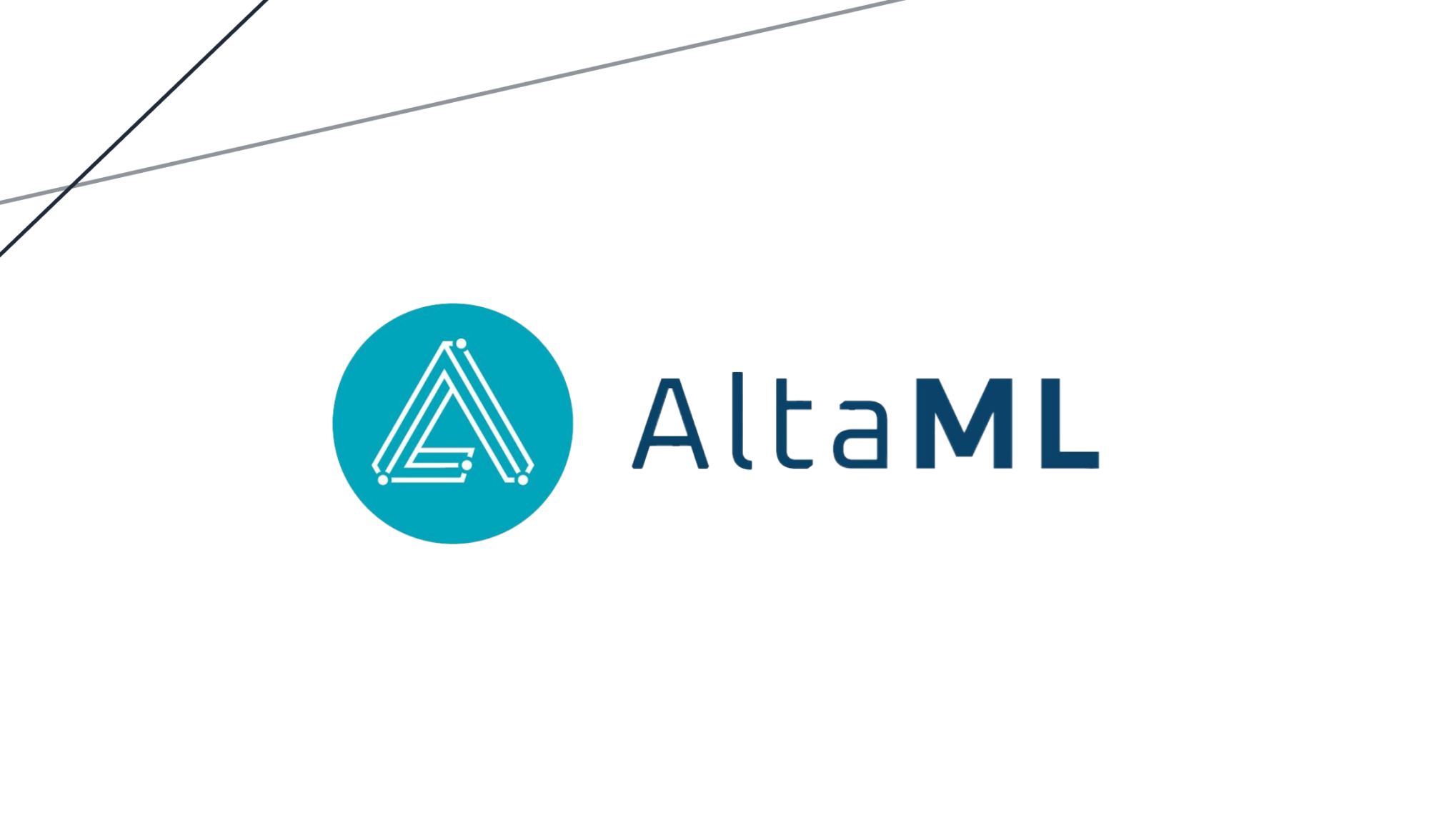The Canadian startup uses ethical artificial intelligence to help modernize everything from power and utilities, to supply chains and health care.
Artificial intelligence is the tech topic on everyone’s lips. A mixture of excitement and fear swirls around the potential and pitfalls of AI for companies, workers, and society at large. Edmonton-headquartered AltaML, which harnesses data to build AI-powered solutions across an array of industries, acknowledges those worries and is adamant that AI, created and deployed responsibly, is a force for good.
AltaML’s work increases efficiency, optimizes performance, and helps companies make better decisions in a variety of fields, from health care and supply chains to financial services, power and utilities, agriculture, the public sector, and more. For example, in the health care sector, AltaML tools can help predict pandemic cases weeks in advance and suggest how to best allocate resources to respond accordingly. When it comes to improving supply chains, their work has helped reduce warehouse needs, improve lead time prediction, sense demand, and forecast operational and customer service needs. In the public sector, AltaML helps with issues ranging from risk management to processing permits and prioritizing infrastructure maintenance.
Core to the AltaML business philosophy is a belief in ethical AI practices and ongoing maintenance of their work to prevent potential biases from seeping in. Nicole Janssen, AltaML co-founder and co-CEO, is a leading voice for responsible AI—a field which she says Canada is perfectly poised to become a global leader in.
“Canada is one of the top three countries in the world for AI,” she says. “Here’s this massive opportunity for Canada, but it’s going to mean bringing academia, government, and industry together to do it.”

Nicole Janssen, co-founder and co-CEO, AltaML
AI doesn’t automatically equal job losses
One of the biggest challenges for startups in the AI space is overcoming the fear associated with new technologies. In AI’s case, Hollywood movies and headlines have portrayed artificial intelligence as a negative force that will take people’s jobs, leading to a dystopian future of mass unemployment. As a result, AltaML spends a lot of time educating not just potential clients, but their employees, on how AI actually works and its ability to improve workplaces, not destroy them.
“The media and movies have portrayed AI in a particular way for a long time, which is why we start all of our engagements with education, not only at the executive level, but all the way down to the end user to understand what the capabilities for AI are and, not only look at the potential, but also the risks and how we mitigate them,” says Janssen.
“The media and movies have portrayed AI in a particular way for a long time, which is why we start all our engagements with education.”
She points out that, in AltaML’s history, there’s never been a job lost as a result of one of their AI projects. Instead, Janssen says, “It’s been integrated in a way that reduces some of those menial tasks people have to do. And then those people can be redeployed for more impactful work.”
While Janssen acknowledges that, over time, some jobs may become obsolete, AI will also likely create many new roles and careers. “There are a lot of careers that will come from AI; there are still humans that will be needed in the loop,” she says. “So really, when we say we focus on elevating human potential, it’s about looking at use cases where we can help humans to make the best decisions, make them better at their jobs, and help them focus on the best uses of their time.”
Responsible AI is a non-negotiable
All AI isn’t created equal. AltaML places great emphasis on the importance of responsible artificial intelligence, which, if adopted widely, should further quell fears around the technology.
“Responsible AI is a governance framework for how you develop AI that makes sure that you look at it from an ethical and legal perspective. It asks, how do you ensure the AI is developed in a way that it’s fair, transparent, trustworthy, safe, and reliable,” says Janssen. “All of those things have to be looked at from the get-go, from what pieces of data we use to the experience of that end user. We have to ask, what might happen if this gives us the wrong answer? It’s really about building AI in a way that ensures that you come up with the best product.”
AltaML works with the nonprofit Responsible Artificial Intelligence (RAI) Institute and uses its protocols to continually check for issues, such as bias, in all their projects. Janssen emphasizes that responsible AI isn’t a one-time act, but an ongoing effort. “We’re also part of long-term maintenance of our work because a model might start unbiased, but over time, it can become biased if you leave it unchecked. We ensure it’s continually being monitored.”\

AltaML team
Getting creative about talent shortages in the AI industry
“Talent is challenging in this area because this isn’t a career that’s been around for 30 years. You’re never going to find a 30-year veteran in this space to hire. That doesn’t exist,” says Janssen. “In most cases, you’re hiring people right out of school.”
“Talent is challenging because this isn’t a career that’s been around for 30 years. You’re never going to find a 30-year veteran in this space to hire. That doesn’t exist.”
To help increase the AI talent pool, AltaML created talent accelerators to better support new graduates and upskill them for key roles. “Our program takes new grads and puts them in a cohort to work on real-world use cases with client data or with public sector data on problems the company is actually solving,” says Janssen.
The talent accelerator program is led by the company’s senior team and brings in new cohorts of approximately 50 interns every four months. Janssen says many of AltaML’s junior hires come directly from the program.
In fact, AltML can barely keep up with demand for their talent accelerators. “For one of the public sector talent cohorts, we had more than 1,300 applications for 20-some spots. The demand is absolutely there. It’s been incredible. We really do get to pick the very best,” says Janssen.
Success is all about making little bets
AltaML’s business philosophy revolves around making little bets in a tech industry that’s often obsessed with gargantuan bets. Janssen says this is core to how the company works with clients. “There’s this idea that if you take on an AI project, it’s automatically going to transform your whole business,” she says. “But that will fail. This is because you haven’t first tackled the adoption obstacle; you haven’t built an AI muscle in your organization, got people used to the concept, or got them excited about AI long before you even look at taking on a massive project.”
“Start small, find some small wins, and get a continual practice of small wins with AI before starting those larger projects.”
“We suggest to all of our clients to start small, find some small wins, and get a continual practice of small wins with AI before starting those larger projects.”
AltaML also uses the little bets philosophy internally. The company focuses on making relatively small, but effective, changes to workflows and processes to improve productivity rather than attempting complete overhauls. This has been as simple as changing the way development teams track their time so that AltaML’s finance team isn’t negatively impacted.
“That’s what we’re constantly talking about at the leadership level. What causes challenges for your team? How can we find that five-hour reduction of work? How can we find that small win to support your team better?” says Janssen. “That allows us to continually improve. Yes, we do big projects and they’re important, too—but it can be really deflating to work on a big project for two years that never comes to fruition. We try to keep iterating and look for small wins and little bets.”
AltaML’s relationship with RBCx has been part of that little bets strategy. More than just a banking solution, Janssen says RBCx continually helps her company work through problems and find solutions of all sizes. “When you’re a business of our size and growth, there are a lot of ups and downs: the growth, and then the dip, and then more growth and dips. We’ve always been able to call RBC and say, we have a problem, or how can I solve this?”
“You spend much of your career hearing, ‘don’t talk to the bank,’ because, if you do, you’ll regret it. That’s never been our experience,” says Janssen of RBCx.

Cory Janssen, co-founder and co-CEO, AltaML with Nicole Janssen, co-founder and co-CEO, AltaML
AI literacy isn’t just for software developers and tech startups
One of AltaML’s core values is education, centred on AI literacy. “It’s important because AI is the future of all businesses. Businesses and individuals who refuse to adopt AI will be the ones out of a job, not the ones who are bringing AI in,” says Janssen.
“It’s often not the data scientist who comes up with a problem to solve. It’s the people who deal with those problems on a day-to-day basis.”
This isn’t just limited to workers at tech startups or software developers, either. “It’s important everyone at our company is looking for opportunities to use AI. It doesn’t matter who you are—the office manager or a bookkeeper, because it’s often not the data scientist who comes up with a problem to solve,” says Janssen. “It’s the people who deal with those problems on a day-to-day basis and say, wait a minute, maybe we can solve this in a different way. That’s where the opportunities really come from and why broad AI literacy is so important to companies.”
AI literacy can also prevent crucial errors, such as the now-infamous case of a lawyer who used ChatGPT to file a motion that ended up containing fake cases. “So many people don’t know what things they should be using ChatGPT for,” says Janssen. “This is a perfect example of why, broadly, we all have to be up to speed on the capabilities and limitations of AI.”
But where to begin? Janssen recommends the book Prediction Machines as well as a Coursera course called AI For Everyone.
To learn more about AltaML, visit AltaML.com.
RBCx backs some of Canada’s most daring tech companies and idea generators. We turn our experience, networks, and capital into your competitive advantage to help drive lasting change. Speak with a RBCx Technology Advisor to learn more about how we can help your business grow.
